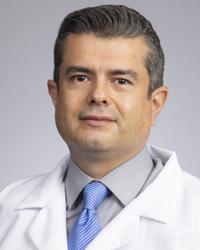5 Facts about Prostate Cancer that May Surprise You
July 4, 2023
Categories: Prostate Cancer, Cancer Care, Men's Health
Tags: prostate cancer

After skin cancer, prostate cancer is the most commonly diagnosed cancer among American men. It's so common that 1 in 8 men will be diagnosed with the disease during his lifetime. In fact, every 2 minutes a man is given a prostate cancer diagnosis. Yet despite the commonality of the illness there are still many facts about prostate cancer that men don't know and need to be aware of.
A family medicine physician for Loyola Medicine, Victor Munoz, MD, shared different facts and figures about prostate cancer that may surprise you. "It's important to know that while prostate cancer has a high survivability rate, it's still a cancer. It needs to be treated seriously, and men, especially older men 60 years old and above, need to know about the risks" says Dr. Munoz.
1. Family history is strongly linked to prostate cancer
Hereditary factors, like a past or present family member that developed prostate cancer, are one of the biggest risk factors for the disease. Of all major cancers, prostate cancer is the one that is the most determined by genetics; 58% of all cases.
"The association between family history and the chance of developing prostate cancer is very high," says Dr. Munoz. "When I have patients come in with symptoms of possible prostate cancer, they often have a family history of the disease. Usually a father, grandfather or uncle."
The risk increases if multiple family members have prostate cancer. For example, men with one close relative with the illness may be twice as likely to develop it. Men with 2 or more relatives? They are four times as likely. And the risk is even higher if those affected family members were diagnosed before age 60.
2. Lifestyle choices may not increase your risk
For the vast majority of cancers, poor lifestyle choices are correlated with an increased risk in developing those cancers. Tobacco, alcohol, poor diet of high calories and fats, obesity, and a general sedentary lifestyle all increase the chance of developing different cancers.
However, prostate cancer is different. There currently is no proven evidenced-based link between obesity, smoking or other poor lifestyle choices and the development of prostate cancer.
"This may shock your readers, but there is currently no proven evidenced-based linkage between lifestyle choices and a man being diagnosed with prostate cancer; it's a very weak correlation," says Dr. Munoz. "Research shows that smoking, poor diet habits, obesity and decreased exercise have no strong correlation, to the development of prostate cancer. Family history is the biggest determiner."
"Of course, we still promote good lifestyle choices because we want our patients to live healthy lives. But if you're specifically worried about prostate cancer, learn more about your family history."
3. Young men developing prostate cancer is rare
Prostate cancer is a disease of older men. The average age of a prostate cancer diagnosis is between 65 and 70 years old, with 75% of prostate cancer deaths occurring in men aged 75 or older. In fact, the disease is so highly associated with older men that your chance of developing the disease jumps from 2% for men ages 40 to 59 to 14% once you turn 60 years old.
On the other side, men younger than 39 years old have little to worry about. The probability of young men developing prostate cancer is 0.005%. However, if a young man develops the disease, it can be more life-threatening.
"The chance of a young man developing prostate cancer is rare. It does happen, but it's rare. Unfortunately, when it does occur at that age, it's usually a more aggressive form of the cancer," says Dr. Munoz.
The symptoms of prostate cancer are similar across age groups. The more common symptoms include:
- Nocturia (increased urination at night)
- Frequent urination during the day
- Hesitancy during urination (it takes longer to start urinating)
- Weak urinary stream
- Blood in urine
4. African-American men develop prostate cancer more often and earlier
While it may seem like all ethnicities of men would develop prostate cancer at equal rates, that isn't the case. In fact, African-American men are 60% more likely to develop this disease than their white counterparts and at an earlier age.
"In general, African-American men are at a much higher risk of getting prostate cancer than other races of men. They are even getting it at an earlier age compared to Caucasian males," says Dr. Munoz.
Interestingly, while an African-American male has a higher chance of being diagnosed with prostate cancer, the disease is comparably less common in Latino and Asian men.
There are a number of reasons why this may be. As previously mentioned, genetics play a role and it's possible that inherited, biological factors play a stronger role in African-American men. Also, this group tends to receive less active treatment due to a lack of affordable and readily available health care.
5. Prostate cancer treatment may not always be needed
When someone hears cancer, they assume that it requires immediate treatment. However, this sometimes isn't the case for prostate cancer patients who have a slow-growing form of the disease.
Many times, signs of prostate cancer may show up in laboratory work during a yearly check-up, but no other symptoms are presenting themselves. In this case, the urologist may suggest to the patient that they simply wait and be monitored to determine the best path forward. Of course, this means that every appointment is important so men should not skip future tests.
It's also possible the physician has determined that patients who are advanced in age or have other medical conditions may not be the best candidates for treatment. Radiation or chemotherapy, surgery and other cancer treatments can be very stressful for an elderly man and potentially decrease the overall health of the patient more so than the cancer itself.
Loyola primary and specialty care offices are conveniently located throughout Chicago’s western and southwestern suburbs. The Urology department at Loyola Medicine has one of the most comprehensive and advanced teams in the nation.
To make an appointment, call 888-584-7888 or schedule an appointment online.
Victor Munoz, MD is a family medicine physician at Loyola Medicine. Dr. Munoz received his medical education from the University of Illinois at Chicago College of Medicine before completing his residency at Resurrection Medical Center.
Dr. Munoz specializes in family medicine, seeing patients before their illness or condition worsens. He provides his patients with comprehensive exams, including screenings and annual physical exams. Being in family medicine, Dr. Munoz cares for the entire spectrum of life; from newborns to the elderly.
Book an appointment today to see Dr. Munoz or another Loyola physician by self-scheduling an in-person or virtual appointment using myLoyola.
